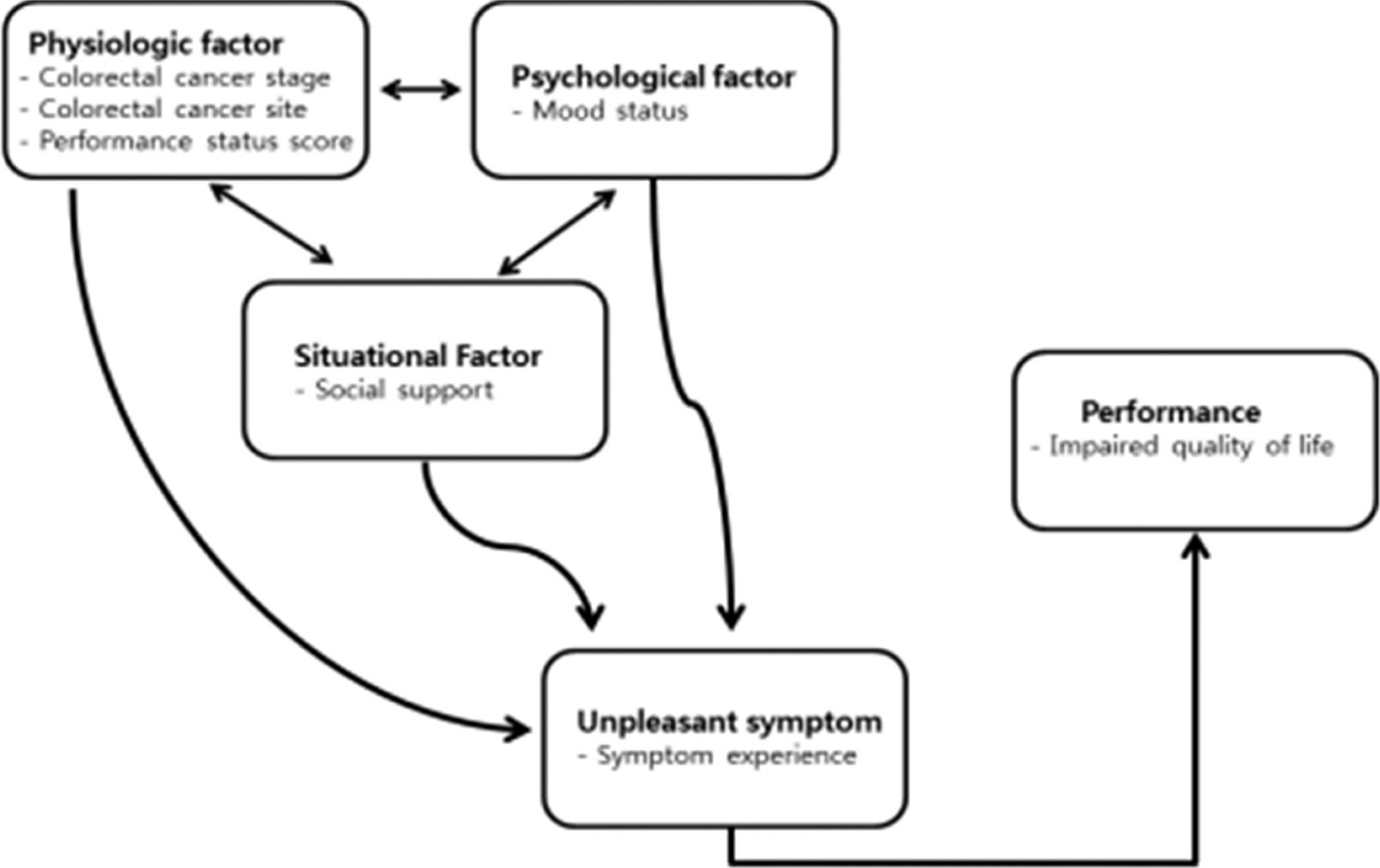초록
Purpose
This study is to determine the effects of Colorectal Neoplasms patients’ stage, location of disease, functional status (physio-logical factor), mood (psychological factor), and social support (situational factor) on their symptom experience, and to verify the relationship between symptom experience and the quality of life.
Methods
The Theory of Unpleasant Symptoms was the framework for the study. A descriptive correlational design was used in analysis of data obtained from a sample of 113 Colorectal Neoplasms patients who were undergoing chemotherapy.
Results
Total mood disturbance and symptom experiences were negatively correlated with physical component score (PCS) and mental component score (MCS) of quality of life (r −.33 to r=−.51, p<.001; r=.40 to r=.50, p<.001). Multiple regression analysis revealed that the functional status and symptoms interference variables explained 29.2% of the variance in PCS of quality of life. Symptoms interference and age explained 30.6% of the variance in MCS of quality of life.
Go to : 
REFERENCES
1. Ferlay J, Soerjomataram I, Dikshit R, Eser S, Mathers C, Rebelo M, et al. Cancer incidence and mortality worldwide: sources, methods and major patterns in GLOBOCAN 2012. Int J Cancer. 2015; 136:E359–86.

2. National Cancer Information Center (KR). Annual report of cancer statistics in Korean: cancer incidence [Internet]. Available from. https://www.cancer.go.kr/lay1/S1T639C640/contents.do. [Accessed January 9, 2018].
3. Jung KW, Won YJ, Oh CM, Kong HJ, Lee DH, Lee KH, et al. Cancer statistics in Korea: incidence, mortality, survival, and prevalence in 2014. Cancer Res Treat. 2017; 49:292–305.

4. National Cancer Information Center (KR). Annual report of cancer statistics in Korean: 5-year relative survival rate [Internet]. Available from. https://www.cancer.go.kr/lay1/S1T648C650/contents.do. [Accessed May 4, 2018].
5. Jeong G, Kim K, Kwak Y. Quality of life in colorectal cancer patients according to the severity of symptom clusters classification. Asian Oncol Nurs. 2014; 14:74–83.

6. Ali WG, Ayoub NS. Nurses' attitudes toward caring for dying patient in Mansoura university hospitals. J Med Biomed Sci. 2010; 1:16–23.
7. Wong P, Reker G, Gesser G. Death attitude profile-revised: a multidimensional measure of attitudes toward death. Washington, DC: Taylor & Francis;1994.
8. Kim SH, Choi YS, Shin SW, Chong MK, Lee SN, Lee SW, et al. Development of education program for physicians based on the 2004 hos-pice palliative model project for terminal cancer. Korean J Hosp Palliat Care. 2006; 9:67–76.
9. Lenz ER, Pugh LC, Milligan RA, Gift A, Suppe F. The middle-range theory of unpleasant symptoms: an update. ANS Adv Nurs Sci. 1997; 19:14–27.

10. Kim HJ, Kim SH, Lee HK, Oh SE. Factors affecting symptom experiences of breast cancer patients - based on the theory of unpleasant symptoms. Asian Oncol Nurs. 2014; 14:7–14.
11. Keum KS, Yi M, Bang KS, Cho YA, Lee JL, Lee E. Relationships among activity status, anxiety, depression, social support, symptom experience, and functional status in lung cancer patients based on the theory of unpleasant symptoms. Perspect Nurs Sci. 2013; 10:87–96.
12. Kim JS, Seo YS. Factors influencing on quality of life in patients with liver cirrhosis: convergence on the theory of unpleasant symptoms. J Digit Converg. 2015; 13:271–81.

13. Lee HJ. Functional status, symptom experience and influential factors in gastric cancer patients with gastrectomy based on the theory of unpleasant symptoms [dissertation]. Seoul: Yonsei Univ.;2015.
14. Zubrod CG, Schneiderman M, Frei E 3rd, Brindley C, Lennard Gold G, Shnider B, et al. Appraisal of methods for the study of chemotherapy of cancer in man: comparative therapeutic trial of nitrogen mustard and triethylene thiophosphoramide. J Chronic Dis. 1960; 11:7–33.

16. Yeun EJ, Shin-Park KK. Verification of the profile of mood states-brief: cross-cultural analysis. J Clin Psychol. 2006; 62:1173–80.

17. Zimet GD, Dahlem NW, Zimet SG, Farley GK. The multidimensional scale of perceived social support. J Pers Assess. 1988; 52:30–41.

18. Shin JS, Lee YB. The effects of social supports on psychosocial well-being of the unemployed. Korean J Soc Welf. 1999; 37:241–69.
19. Baek Y. The correlation among symptoms, anxiety, depression and quality of life in patients with colorectal cancer undergoing chemotherapy [dissertation]. Seoul: Seoul National Univ.;2013.
20. Yun YH, Mendoza TR, Kang IO, You CH, Roh JW, Lee CG, et al. Validation study of the Korean version of the M. D. Anderson Symptom Inventory. J Pain Symptom Manage. 2006; 31:345–52.

21. Ware JE, Kosinski M, Keller SD. A 12-Item Short-Form Health Survey: construction of scales and preliminary tests of reliability and validity. Med Care. 1996; 34:220–33.
22. Lee I. The effect of communication on marital adjustment of cancer patients and their spouses - focusing on the actor effect and partner effect -. Korean J Soc Welf. 2011; 63:179–205.
23. Park EJ, Jeon YW, Han SI, Oh SJ. A preliminary study on the quality of life for patients who had breast cancer operations. J Korean Breast Cancer Soc. 2004; 7:299–305.

24. Cha K, Kim K. Impact of uncertainty on resilience in cancer patients. Asian Oncol Nurs. 2012; 12:139–46.

25. Kwon EJ, Yi M. Distress and quality of life in breast cancer survivors in Korea. Asian Oncol Nurs. 2012; 12:289–96.

26. Cho OH, Yoo YS. Psychosocial adjustment, marital intimacy and family support of post-mastectomy patients. J Korean Oncol Nurs. 2009; 9:129–35.
27. Kim HJ, Kwon JH, Kim JN, Lee R, Lee KS. Posttraumatic growth and related factors in breast cancer survivors. Korean J Health Psychol. 2008; 13:781–99.
28. Jo H, Kim B, Lee H, Lee B. Perceived social support as influencing factors on quality of life among cancer patients. Korean J Health Educ Promot. 2010; 27:51–9.
Go to : 
Table 1.
Descriptive Statistics for Study Variables (N =113)
Table 2.
Demographic and Quality Of Life according to Sample's Characteristics
Table 3.
Quality Of Life according to Disease-related Characteristics (N =113)
Table 4.
Correlations among the Study Variables (N =113)
Table 5.
The Predictors of SF Score (N =113)




 PDF
PDF ePub
ePub Citation
Citation Print
Print



 XML Download
XML Download